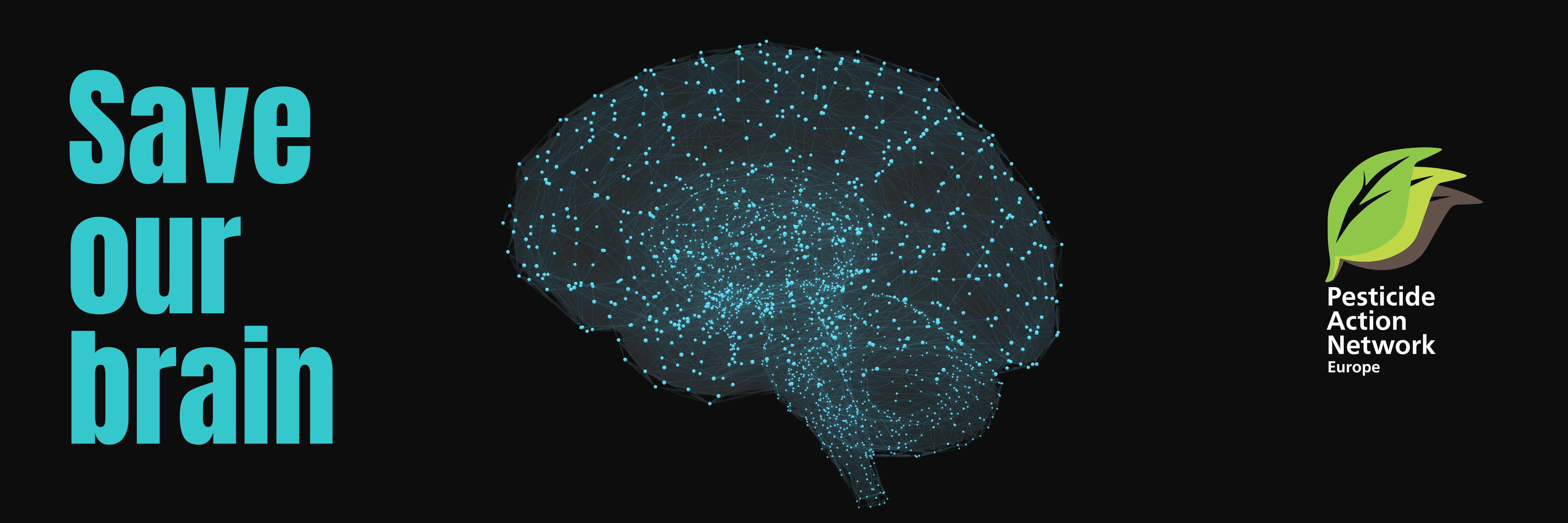
Pesticides can have very serious and lasting effects on our brain. Some can harm the developing brains of young children, while others can lead to chronic conditions such as Parkinson’s disease. It is therefore completely incomprehensible that pesticides are hardly tested for their long-term effect on brain and nervous system before being authorised for use. Our campaign exposes the EU’s regulatory failure and puts potentially or proven neurotoxic pesticides in the spotlight. We advocate for a thorough re-assessment of all pesticides currently approved in the EU and a swift ban of all substances that show neurotoxicity.
We think it is of great urgence to address this issue. It should be obvious that children and pregnant women should not be exposed to any trace of neurotoxic pesticides at all. But the same applies to adults. Expert neurologists warn of a Parkinson’s epidemic and see it as a ticking time bomb. [1] They link this to the use of pesticides and demand swift action. [2] We don’t have specific funding to work on this topic, but we did quite some work over the last few years as you can see in our list of publications below. We will dedicate more time to this campaign. We could do a lot more if we had the proper resources.
Failing EU regulation
The Dutch National Health and Environment Institute RIVM concluded in 2021 that the current pesticide assessment is insufficient: “The data requirements for active ingredients in pesticides do not include standard information regarding the effects of these substances on the nervous system. The current testing guidelines also do not provide sufficient insight into whether a substance can cause small inconspicuous changes in the brain that can lead to diseases such as Parkinson’s.” and proposed possible solutions. [3]
The Dutch government asked EFSA to look into this. In a 2022 conference 49 experts from many countries participated, including six from EFSA. They came to a very clear conclusion.
“Overall, there was broad consensus that the currently existing procedures, that are part of existing regulatory actions, are likely to give us an inadequate insight into the actual neurotoxic actions of specific pesticides for the substantia nigra, and consequently, offer an inadequate assessment of the risk of developing Parkinson's disease in case of human exposure.”
There was also broad recognition that better experiments are necessary, and how they should be designed: “Additionally, there are clear ideas on how to perform experiments that will inform an improved screening procedure; this involves both improved in vivo experiments and the search for reliable in vitro alternatives.”
The minutes of this meeting are not available on the EFSA website. So you can find it here. [4]
EFSA wastes precious time and delays the necessary action
In reaction, the EFSA board organised a call for new research on neurotoxicity. However, it did not meet the expectations of participants in the conference. The Dutch National Health and Environment Institute RIVM informed their minister:
“The call is not in line with the ambitions expressed during the workshop but focuses exclusively on repeating research previously commissioned by EFSA on mitochondrial respiratory disruption by plant protection products. Thus, for RIVM, the current scope of the project is too limited to solve the underlying problem, the missing assessment framework for the identification of neurodegenerative substances.” [5]
The Radboud University Nijmegen, the RIVM and the Dutch pesticide authority Ctgb wrote a joint letter to EFSA to express their disappointment. “In our opinion, the current call for tender and the work it foresees to cover does not address the challenges that were identified during the workshop and therefore does not contribute enough to the ultimate goal of being able to assess the risk of chemical exposure related to neurodegenerative diseases.” [6]
Read the full story: EFSA scandal: management sabotages effective pesticide neurotoxicity assessment.
Problematic neurotoxic pesticides
- Deltamethrin and other synthetic pyrethroids
- Difenoconazole and other azole pesticides
- Acetamiprid and other neonicotinoids
- Glyphosate
- Chlorpyrofos (finally banned in the EU in 2020, not in the US)
- Paraquat (banned in the EU and China, not in the US)
The Parkinson Pandemic - A Call to Action
[1] The Emerging Evidence of the Parkinson Pandemic, E Ray Dorsey, Todd Sherer, Michael S Okun, Bastiaan R Bloem, 2018
[2] Neurodegeneration in a regulatory context: The need for speed, Science Direct, March 2023
[3] Pesticides and neurodegenerative diseases: possibilities for improving the market authorisation requirements, RIVM, 18 November 2021
[4] EFSA neurotoxicity workshop agreed minutes, 7-8 September 2022
[5] Letter from Dutch National Health Institute RIVM to Dutch minister, 18 April 2023
[6] Letter from Dutch National Health Institute RIVM to EFSA, 17 July 2023 (in our possession)
Read more:
-
Acetamiprid: the brain-toxic neonicotinoid we must urgently leave behind, March 2025
-
Pesticide deltamethrin causes brain damage in offspring at 'safe' dose, March 2025
-
Neurotoxic pesticides affect children’s brain: global restrictions urgently needed!, PAN Europe, November 2024
- EFSA scandal: management sabotages effective pesticide neurotoxicity assessment, PAN Europe, October 2023
- Children are the first victims of neurotoxic pesticides, PAN Europe, August 2023
- EU citizens are not protected against neurotoxic effects of pesticides, PAN Europe June 2023
- Neurotoxicity of pesticides, PAN Europe letter to EU Health Commissioner Kyrikides, June 2023
- EU Commission refuses to protect children and the unborn against neurotoxic pesticides, PAN Europe, June 2022
- Letter on the presence of neonicotinoids in children's cerebrospinal fluids PAN Europe, April 2022 and answer on behalf of the EU Commission, May 2022